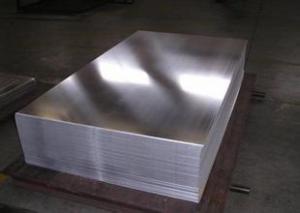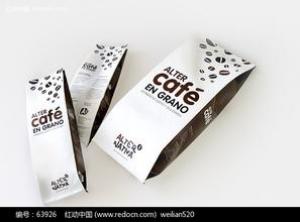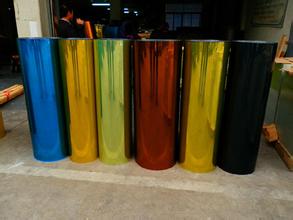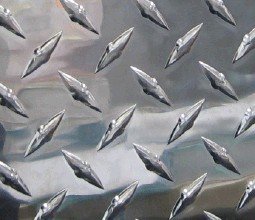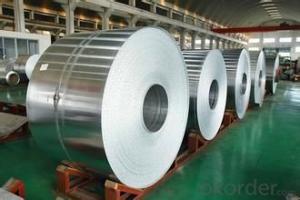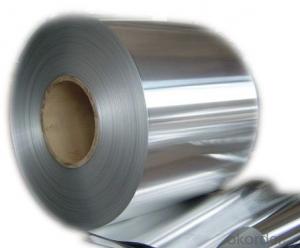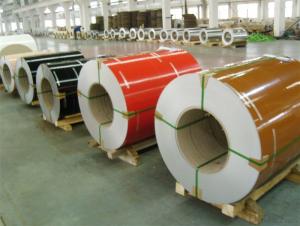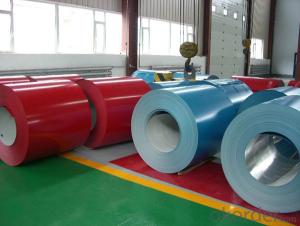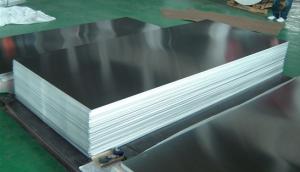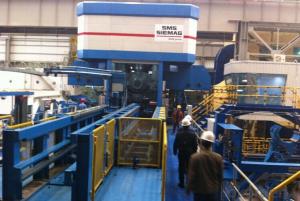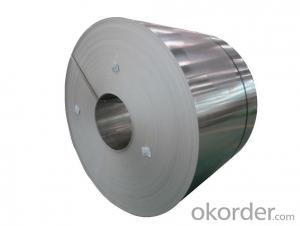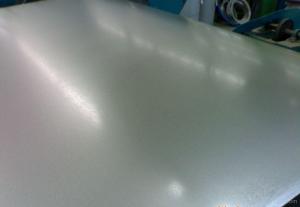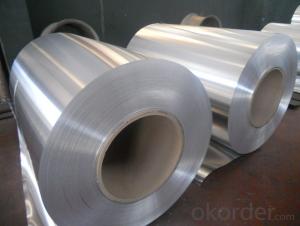Rollex 309 Aluminum Coil Stock - Aluminium Strip and Strips, Sheet and Sheets
- Loading Port:
- Shanghai
- Payment Terms:
- TT OR LC
- Min Order Qty:
- 10 m.t.
- Supply Capability:
- 1000 m.t./month
OKorder Service Pledge
OKorder Financial Service
You Might Also Like
ALLOY: AA1***
AA3***
AA5***
TEMPER: H14 H16 H18 H22 H24 H26 H32 O/F
THICKNESS:0.03MM-3.0MM
WIDTH: 30MM-1700MM
COATING: PE(POLYESTER),PVDF,EPOXY
STANDARD: GB/T 17748-1999
Special specification is available on customer's requirement
SURFACE QUALITY: GOOD APPEARANCE WITH NO-CRACK AND WELL-DISTRIBUTE GRAIN.
BUILD UP: TIGHT SLIT EDGES FREE FROM CRACKS, LAYER TO LAYER SHIFT NOT MORE THAN 2MM.
PROFILE: -0/+1%
FLATNESS: MILL FLATNESS COIL HAVING EDGE WAVINESS RATHER THAN CENTER BUCKLES SHALL BE ACCEPTABLE.
ROLLING PERFORMANCE: RE-ROLLABLE TO THE FINAL DESIRES GAUGES
Aluminium foil (or aluminum foil) is aluminium prepared in thin metal leaves with a thickness less than 0.2 millimetres (8 mils); thinner gauges down to 6 micrometres (0.24 mils) are also commonly used.In the United States, foils are commonly gauged in thousandths of an inch or mils. Standard household foil is typically 0.016 mm (0.63 mils) thick, and heavy duty household foil is typically 0.024 mm (0.94 mils). Thefoil is pliable, and can be readily bent or wrapped around objects. Thin foils are fragile and are sometimeslaminated to other materials such as plastics or paper to make them more useful. Aluminium foil supplantedtin foil in the mid 20th century.
Annual production of aluminium foil was approximately 800,000 tonnes (880,000 tons) in Europe and 600,000 tonnes (660,000 tons) in the U.S. in 2003. Approximately 75% of aluminium foil is used for packaging offoods, cosmetics, and chemical products, and 25% used for industrial applications (e.g. thermal insulation, cables and electronics).
In North America, aluminium foil is known as aluminum foil. It was popularized by Reynolds Metals, the leading manufacturer in North America. In the United Kingdom and United States it is, informally, widely called tin foil, for historical reasons (similar to how aluminum cans are often still called "tin cans").Metallised films are sometimes mistaken for aluminium foil, but are actually polymer films coated with a thin layer of aluminium. In Australia, aluminium foil is widely called alfoil.
- Q: Pretty please can someone show me the steps on how to do this one?Calculate the mass in grams of iodine (I2) that will react completely with 43.7 g of aluminum (Al) to form aluminum iodide
- Aluminum Iodide is AlI3 - one aluminum atom bonded to three Iodine atoms. Look up the atomic weight of Aluminum. Look up the atomic weight of Iodine. Al / 43.7g =3 X Iodine / mass Mass of Iodine required = 43.7 X Atomic weight of Iodine X 3 / Atomic weight of Aluminum
- Q: Can aluminum coils be customized in terms of thickness?
- Yes, aluminum coils can be customized in terms of thickness. The thickness of aluminum coils can be adjusted according to the specific requirements of a particular application. This customization is achieved through a process called aluminum coil slitting, where the original coil is cut into narrower coils of desired thickness. This allows for flexibility in meeting various needs and specifications of different industries.
- Q: Can aluminum coils be used in the production of household appliances?
- Household appliances can indeed utilize aluminum coils in their production. Aluminum, a material known for its lightweight and durable nature, boasts exceptional thermal conductivity, rendering it highly suitable for various appliance applications. Refrigerators, air conditioners, and heat pumps, for instance, greatly benefit from the utilization of aluminum coils. These coils are commonly employed in the condenser and evaporator coils of such appliances, efficiently facilitating heat transfer. Moreover, the corrosion resistance of aluminum coils is pivotal in ensuring the longevity and optimal performance of household appliances. Consequently, owing to their advantageous properties and benefits, aluminum coils remain a favored option in the production of household appliances.
- Q: What are the different types of aluminum coils available?
- There are several types of aluminum coils available, including painted coils, embossed coils, brushed coils, anodized coils, and perforated coils. Each type offers unique characteristics and applications, catering to various industries and aesthetic preferences.
- Q: Are aluminum coils suitable for high-reflective applications?
- Yes, aluminum coils are highly suitable for high-reflective applications. Aluminum has excellent reflective properties, making it ideal for a wide range of applications requiring high reflectivity, such as solar panels, LED lighting, and reflective coatings. Additionally, aluminum is lightweight, durable, and corrosion-resistant, making it a preferred choice for various industries.
- Q: How do aluminum coils contribute to the energy efficiency of products?
- Aluminum coils play a crucial role in enhancing the energy efficiency of various products. Firstly, aluminum is known for its excellent thermal conductivity, which allows for efficient heat transfer. This characteristic enables aluminum coils to quickly and effectively transfer heat between different components within a product, such as in air conditioning systems or refrigerators. By efficiently dissipating heat, aluminum coils help these products operate more efficiently, reducing energy consumption and ultimately saving costs for consumers. Additionally, aluminum is a lightweight material, which makes it easier to incorporate into various products without adding unnecessary weight. This is particularly beneficial for industries such as automotive and aerospace, where reducing weight is essential for improving fuel efficiency. By using aluminum coils in these applications, manufacturers can achieve lighter and more energy-efficient vehicles or aircraft, resulting in reduced fuel consumption and emissions. Furthermore, aluminum coils offer excellent corrosion resistance. This is especially advantageous in products exposed to moisture or harsh environments, as it prevents rust and degradation over time. By maintaining the performance and integrity of the coils, the overall energy efficiency of the product is preserved, ensuring that it operates optimally for an extended period. In conclusion, aluminum coils contribute significantly to the energy efficiency of products through their thermal conductivity, lightweight properties, and corrosion resistance. By effectively transferring heat, reducing weight, and preventing degradation, these coils help products operate more efficiently, resulting in lower energy consumption, cost savings, and reduced environmental impact.
- Q: Aluminum silicate felt fiber needle blanket noise reduction?
- Aluminum silicate needled blanket belongs to the porous material, porosity higher than ninety-six percent in noise reduction has an absolute advantage, because the aluminum silicate needled blanket belongs to soft products, the lack of stress in the industrial application, so there is no large-scale promotion, mainly used in the silencing device of heavy trucks, trucks and cars. And in the heat insulation, aluminum silicate needled blanket technology with a special one-time plastic molding, as the car chassis fireproof heat insulation layer, and now Xiamen Kinglong has reached a cooperation agreement.
- Q: Can aluminum coils be used in marine applications?
- Yes, aluminum coils can be used in marine applications. Aluminum is a popular choice for marine applications due to its excellent corrosion resistance, lightweight nature, and high strength-to-weight ratio. It is commonly used in the construction of boats, ships, and other marine structures. Aluminum coils are particularly useful in marine applications as they can be easily formed into various shapes and sizes, making them suitable for different parts and components in the marine industry. Additionally, aluminum coils can withstand harsh marine environments and are highly resistant to saltwater corrosion, which is a significant concern in marine applications. Overall, the use of aluminum coils in marine applications is a reliable and effective choice.
- Q: Can aluminum coils be custom-made to specific requirements?
- Indeed, specific requirements can be met through the customization of aluminum coils. These coils possess great versatility and can be adjusted to fulfill a diverse array of specifications and applications. Manufacturers possess the capability to tailor the coil's dimensions, thickness, width, and length to accommodate particular needs. Moreover, the application of various surface finishes, including embossed patterns or coatings, can enhance both aesthetic appeal and functionality. The customization of aluminum coils enables the precise fulfillment of specific needs within industries such as construction, transportation, aerospace, and more.
- Q: How many 1220mm*2440mm aluminum sheets can one-ton aluminum coil be sliced to? Thank you.
- If it is 1.0mm thick, the coil can be sliced into 124 pieces. For other thickness, please use 124 divide the thickness.
Send your message to us
Rollex 309 Aluminum Coil Stock - Aluminium Strip and Strips, Sheet and Sheets
- Loading Port:
- Shanghai
- Payment Terms:
- TT OR LC
- Min Order Qty:
- 10 m.t.
- Supply Capability:
- 1000 m.t./month
OKorder Service Pledge
OKorder Financial Service
Similar products
Hot products
Hot Searches
Related keywords
